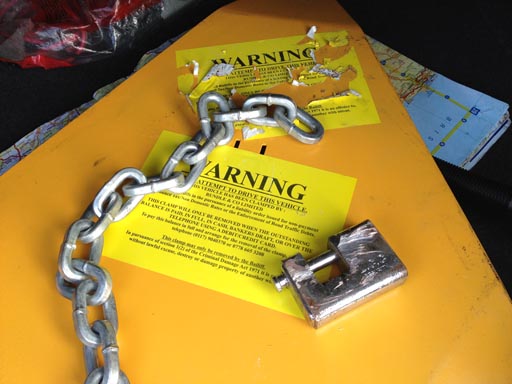11/12/2012
There is a limit to how much I personally can take on, but the war against the "official" thieves (aka bailiffs) nevertheless continues â evidenced by the above, a clamp diligently removed from a car in Bristol this morning after it was fitted by bailiffs in pursuit of an unlawful claim.
The issue here is
inflated charges which the bailiffs seek to collect, either through
phantom visits or by so-called "van fees" for levies that have not been carried out.
A favourite tactic by these thieves is now to clamp vehicles, then posting a threatening notice on the car, claiming that removal of the clamp is a breach of the Criminal Damage Act 1971. But, as
this and
this make clear, a vehicle owner has every right under Common Law to remove a clamp that has been unlawfully fitted.
Neither is there an obligation to return the clamp, unless the people who fitted it can provide documentary proof of ownership, although there is nothing to stop the clamp being held as surety against payment of costs incurred in removing it.
This is the second instance of successful clamp removal that has come to my attention in the past few weeks, and I know of many more. And in each case the bailiffs are powerless to act.
But what is so fundamentally disturbing about all this is that the growing illegality of bailiff action is well known to the authorities and has been drawn to the attention of local authorities, national government and parliament.
Most recently, we have seen
a report from the
Local Government Ombudsman, which makes it very clear that the system is badly off the rails.
To this, there was a response from local government Minister Brandon Lewis, who said, "The use of bailiffs should also be a last resort, they should not be commissioned disproportionately and councils should take direct responsibility for them".
But councils are not taking direct (or any) responsibility for the bailiffs they employ, which means that their entire operations are built on a foundation of illegality. And, as always, parliament does nothing - the MPs all too often concerned only with
lining their own pockets.
As citizens, though, we are constantly reminded of our duty to obey the law, and there is no end of agencies which will prosecute, penalise and otherwise persecute us if we fail to live up to our "obligations". But when government in general (and local government in particular) routinely breaks the law, or knowingly condones illegality, then there is a huge credibility gap.
Most of all though, this official indifference to the rule of law sends its own message. If the authorities feel it is acceptable routinely to break the law, then why should we as citizens feel in any way obliged to obey it? And if we take lead from our masters, what right to they have to object?
COMMENT THREAD

